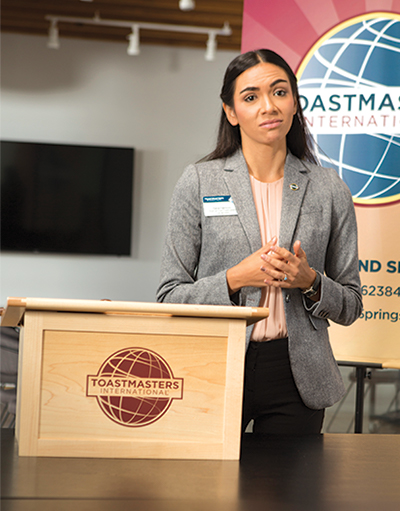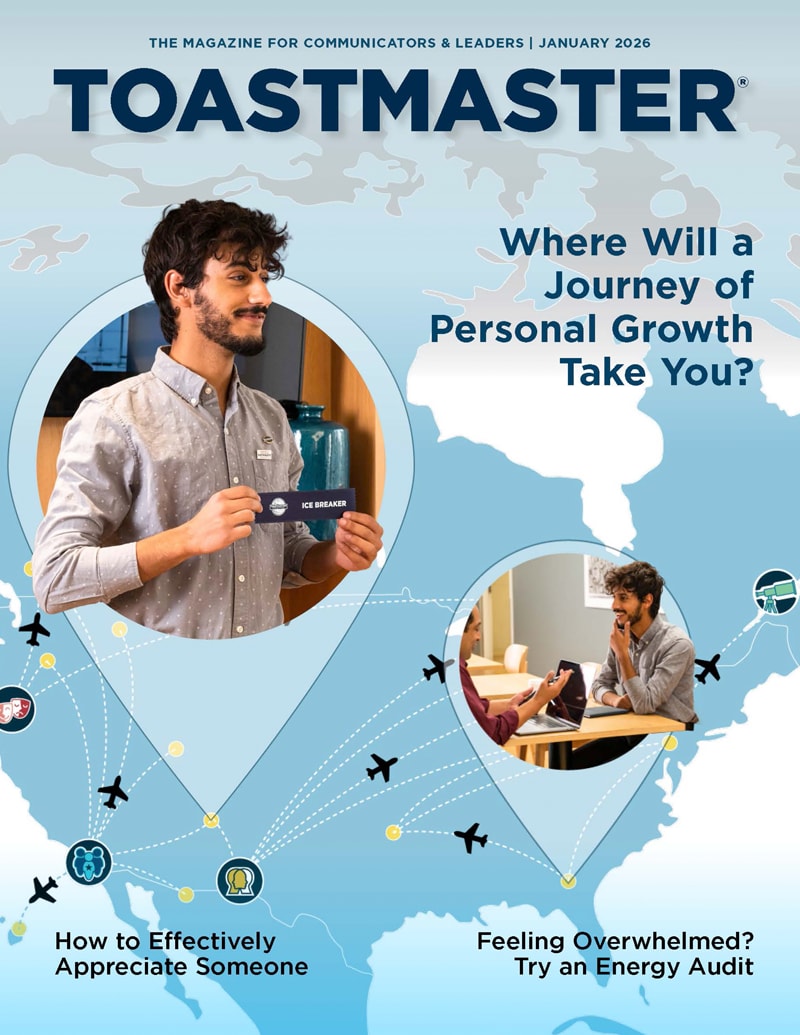
It was a flop! My speech during our recent club contest was a disaster.
First off, I had to compete against Gary. Just his name is intimidating. Everyone in my club has heard him speak; he captivates our attention and enjoys what he’s doing, and it shows. Not that Gary did anything to psych me out on the day of the contest. No need to, I was already nervous for weeks. But that day, Gary put his hand to his throat and croaked, “Boy, I hope I can make it through my speech. I’ve had this cough.” Please! I thought. How lucky if that’s all that’s bothering you. I’ll take the cough; you can have my nerves. My mentor, knowing me well, told me to get my stomach butterflies into formation and breathe.
Gary spoke first in the contest. He hooked the audience—especially me. But when it was my turn to speak, I lost my listeners. Truthfully, however, my flop began long before I delivered my speech. I usually give this advice to new Toastmasters for their speech preparation: Organize your speech by using the five-minute guide. Allot one minute for the introduction, three minutes for the body with two or three subtopics, and one minute for the conclusion. I also tell members to memorize their opening and closing statements.
This time, I went against my own advice. I did not memorize my opening. In fact, I was still changing it on the morning of the contest. Then, when it was my turn to speak, I derailed myself within the first minute. I heard my voice say the same word twice in the same sentence. In my thoughts, I attempted to repeat what I’d just heard while battling my mouth as I continued to speak. My son was in the audience, and it didn’t help to see him drop his head, confirming: Yes, I did just say something strange.
Making matters worse, my story was too broad, my subtopics were separate ideas, and my transitions did not bridge my points. Basically, I had no speech flow. A successful speech has good subtopics; mine had none.
And, while I was still speaking, my eyes wandered to the back wall. I realized I had never noticed that the wall in our meeting room was green. My internal dialogue began while my mouth kept on with my speech, How do you know the wall is green, Michelle? And I answered myself, Because you do not have eye contact with your audience.
“When it was my turn to speak, I derailed myself within the first minute.”
While speaking, you need to focus on what you are doing. Be aware of your gestures and how you use your floor space, and have meaningful eye contact with people in the audience.
What was the message of my speech anyway? I should have focused on that thought weeks before the contest and decided on what kind of speech I was going to deliver. I had signed up for the International Speech Contest. For this kind of speech, I needed to inspire my audience, challenge them to take action or move them with an emotion. Instead, I simply retold the story of something that had happened to me in the past. But this wasn’t a storytelling contest, and I did not stir my audience. Be sure you know the criteria for your speech, find your purpose and stay within the time limit.
Lastly, it does not hurt to send a rough draft of your speech to your mentor. It crossed my mind to do this, but I felt too embarrassed. Pride took over, even though I knew the best thing for me to do was to seek help from my mentor.
Lessons learned: Toastmasters is not the place to feel intimidated. This is Where Leaders Are Made. All club members work on improving their public speaking skills. If we happen to flop with a speech, it’s best to do so in a safe and supportive environment—one that empowers us to develop our communication skills and grow our self-confidence.
Honestly, I needed this experience. I am a better Toastmaster for it, and now I can say, “Watch out, Gary!”



 Previous
Previous
 Previous Article
Previous Article